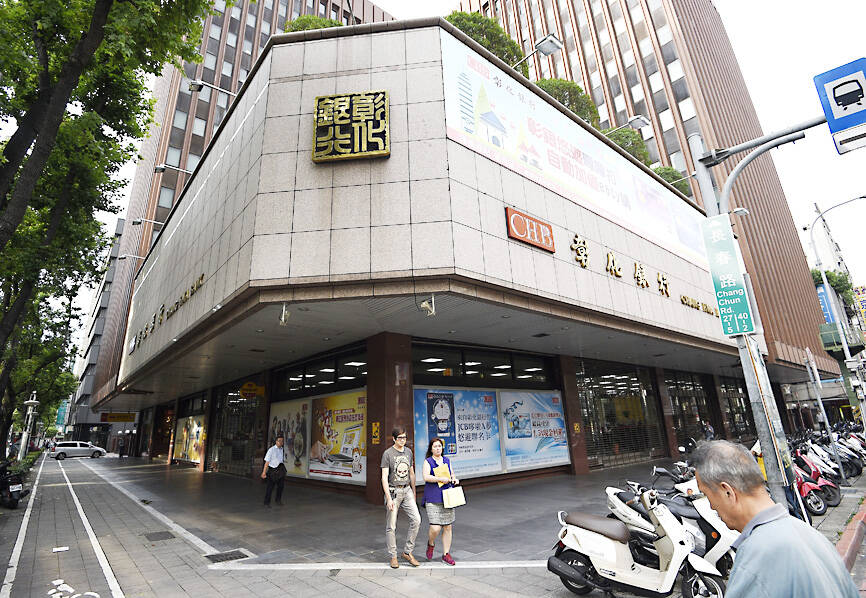Taiwanese banks have slowed their pace in opening representative offices or branches in the countries included in the government’s New Southbound Policy (NSP), data released by the Financial Supervisory Commission (FSC) showed on Friday.
So far this year, only two local banks applied for and received approval to open outlets in New Southbound countries, the commission said.
In June, the FSC approved Chang Hwa Commercial Bank’s (彰化銀行) application to open a branch in Sydney, and in September it allowed E.Sun Commercial Bank (玉山銀行) to set up a representative office in Kuala Lumpur.

Photo: Chen Chih-chu, Taipei Times
While the commission in April approved Taipei Fubon Commercial Bank’s (台北富邦銀行) application to upgrade its representative office in Sydney to a branch, it was not considered a new outlet, the regulator said.
The New Southbound Policy aims to enhance trade and exchanges between Taiwan and 18 countries in Southeast and South Asia, as well as Australia and New Zealand, to reduce Taiwan’s dependence on China.
The policy was introduced after President Tsai Ing-wen (蔡英文) took office in 2016.
In response to the initiative, the commission in 2017 set a goal to encourage Taiwanese banks to open no fewer than three new representative offices or branches in the New Southbound countries each year.
In 2017, the commission approved applications from Taiwanese banks to set up 17 outlets in the 18 countries, and eight each year during the 2018-2020 period before falling to five in 2021 and one last year, FSC data showed.
From 2017 to last month, the commission approved the opening of 49 representative offices and branches in the 18 countries, it showed.
Regarding the drop in interest from local banks in setting up outlets in the countries, Banking Bureau Deputy Director-General Roger Lin (林志吉) said if no more banks apply to open branches by the end of this year to meet the commission’s target, it would consider changing the goal of opening three new outlets per year.
Asked whether the banking markets in the 18 countries have been so saturated that local banks had to scale back their expansion efforts, Lin said it was up to banks to judge the market conditions.
He said that how local financial institutions map out their expansion plans in foreign markets depends on economic activities, and bilateral trade and investments between the markets and Taiwan.

The US dollar was trading at NT$29.7 at 10am today on the Taipei Foreign Exchange, as the New Taiwan dollar gained NT$1.364 from the previous close last week. The NT dollar continued to rise today, after surging 3.07 percent on Friday. After opening at NT$30.91, the NT dollar gained more than NT$1 in just 15 minutes, briefly passing the NT$30 mark. Before the US Department of the Treasury's semi-annual currency report came out, expectations that the NT dollar would keep rising were already building. The NT dollar on Friday closed at NT$31.064, up by NT$0.953 — a 3.07 percent single-day gain. Today,

‘SHORT TERM’: The local currency would likely remain strong in the near term, driven by anticipated US trade pressure, capital inflows and expectations of a US Fed rate cut The US dollar is expected to fall below NT$30 in the near term, as traders anticipate increased pressure from Washington for Taiwan to allow the New Taiwan dollar to appreciate, Cathay United Bank (國泰世華銀行) chief economist Lin Chi-chao (林啟超) said. Following a sharp drop in the greenback against the NT dollar on Friday, Lin told the Central News Agency that the local currency is likely to remain strong in the short term, driven in part by market psychology surrounding anticipated US policy pressure. On Friday, the US dollar fell NT$0.953, or 3.07 percent, closing at NT$31.064 — its lowest level since Jan.

Hong Kong authorities ramped up sales of the local dollar as the greenback’s slide threatened the foreign-exchange peg. The Hong Kong Monetary Authority (HKMA) sold a record HK$60.5 billion (US$7.8 billion) of the city’s currency, according to an alert sent on its Bloomberg page yesterday in Asia, after it tested the upper end of its trading band. That added to the HK$56.1 billion of sales versus the greenback since Friday. The rapid intervention signals efforts from the city’s authorities to limit the local currency’s moves within its HK$7.75 to HK$7.85 per US dollar trading band. Heavy sales of the local dollar by

The Financial Supervisory Commission (FSC) yesterday met with some of the nation’s largest insurance companies as a skyrocketing New Taiwan dollar piles pressure on their hundreds of billions of dollars in US bond investments. The commission has asked some life insurance firms, among the biggest Asian holders of US debt, to discuss how the rapidly strengthening NT dollar has impacted their operations, people familiar with the matter said. The meeting took place as the NT dollar jumped as much as 5 percent yesterday, its biggest intraday gain in more than three decades. The local currency surged as exporters rushed to